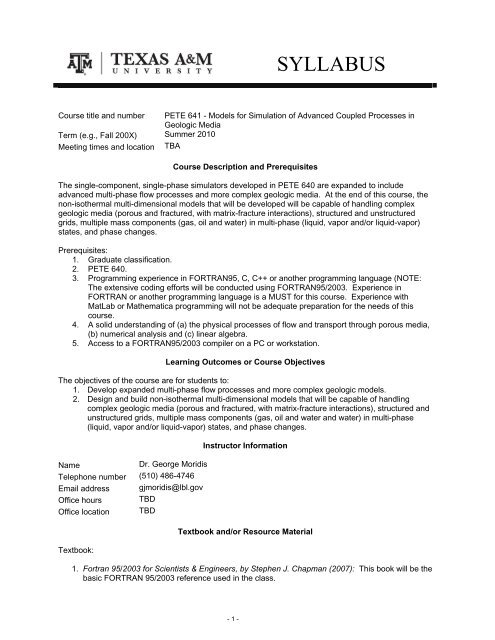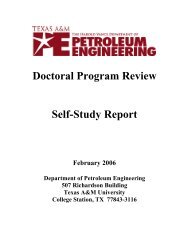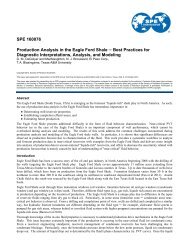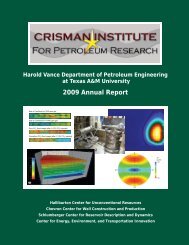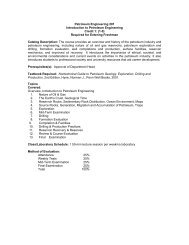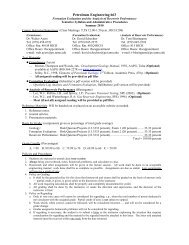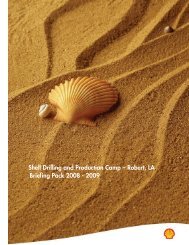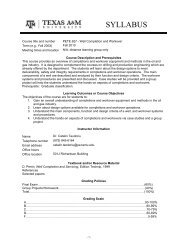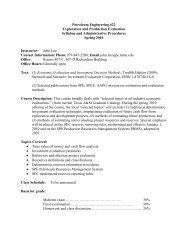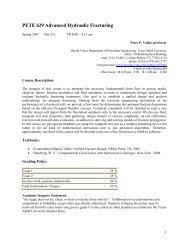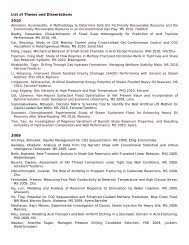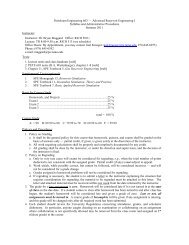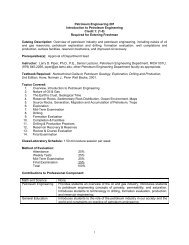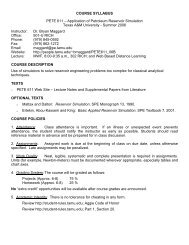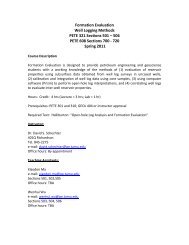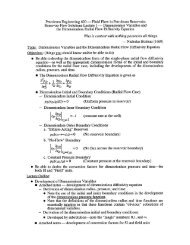Syllabi for TAMU PETE Graduate courses
Syllabi for TAMU PETE Graduate courses
Syllabi for TAMU PETE Graduate courses
Create successful ePaper yourself
Turn your PDF publications into a flip-book with our unique Google optimized e-Paper software.
SYLLABUS<br />
Course title and number <strong>PETE</strong> 641 - Models <strong>for</strong> Simulation of Advanced Coupled Processes in<br />
Geologic Media<br />
Term (e.g., Fall 200X) Summer 2010<br />
Meeting times and location TBA<br />
Course Description and Prerequisites<br />
The single-component, single-phase simulators developed in <strong>PETE</strong> 640 are expanded to include<br />
advanced multi-phase flow processes and more complex geologic media. At the end of this course, the<br />
non-isothermal multi-dimensional models that will be developed will be capable of handling complex<br />
geologic media (porous and fractured, with matrix-fracture interactions), structured and unstructured<br />
grids, multiple mass components (gas, oil and water) in multi-phase (liquid, vapor and/or liquid-vapor)<br />
states, and phase changes.<br />
Prerequisites:<br />
1. <strong>Graduate</strong> classification.<br />
2. <strong>PETE</strong> 640.<br />
3. Programming experience in FORTRAN95, C, C++ or another programming language (NOTE:<br />
The extensive coding ef<strong>for</strong>ts will be conducted using FORTRAN95/2003. Experience in<br />
FORTRAN or another programming language is a MUST <strong>for</strong> this course. Experience with<br />
MatLab or Mathematica programming will not be adequate preparation <strong>for</strong> the needs of this<br />
course.<br />
4. A solid understanding of (a) the physical processes of flow and transport through porous media,<br />
(b) numerical analysis and (c) linear algebra.<br />
5. Access to a FORTRAN95/2003 compiler on a PC or workstation.<br />
Learning Outcomes or Course Objectives<br />
The objectives of the course are <strong>for</strong> students to:<br />
1. Develop expanded multi-phase flow processes and more complex geologic models.<br />
2. Design and build non-isothermal multi-dimensional models that will be capable of handling<br />
complex geologic media (porous and fractured, with matrix-fracture interactions), structured and<br />
unstructured grids, multiple mass components (gas, oil and water and water) in multi-phase<br />
(liquid, vapor and/or liquid-vapor) states, and phase changes.<br />
Name<br />
Dr. George Moridis<br />
Telephone number (510) 486-4746<br />
Email address gjmoridis@lbl.gov<br />
Office hours TBD<br />
Office location TBD<br />
Textbook:<br />
Instructor In<strong>for</strong>mation<br />
Textbook and/or Resource Material<br />
1. Fortran 95/2003 <strong>for</strong> Scientists & Engineers, by Stephen J. Chapman (2007): This book will be the<br />
basic FORTRAN 95/2003 reference used in the class.<br />
- 1 -
2. Class notes and copies of appropriate scientific publications on relevant subjects will be<br />
distributed by the instructor.<br />
Reference Materials:<br />
1. Petroleum Reservoir Simulations: A Basic Approach, by M.R. Islam, S.M. Farouq Ali, J.<br />
H. Abou Kassem, and Jamal H. Abou-kassem (2005)<br />
2. Petroleum Reservoir Simulation, by Khalid Aziz and Antonin Settari (1979)<br />
3. The Properties of Petroleum Fluids, by W. D. McCain<br />
4. The Properties of Gases and Liquids, by Bruce E. Poling, John M. Prausnitz and John<br />
O’Connell (2000)<br />
5. Fortran 95/2003 Explained (Numerical Mathematics and Scientific Computation), by<br />
Michael Metcalf, John Reid, and Malcolm Cohen (2004)<br />
6. Object-Oriented Programming via Fortran 90/95, by Ed Akin (2003)<br />
Grading Policies<br />
Homework (daily assignments; quality and logical thoroughness of code)………………… (100%)<br />
Policy on homework:<br />
o All homework is due (even if late); otherwise, an “Incomplete” grade will be given until homework<br />
is submitted<br />
Grading Scale<br />
A……………………………………………………………………………………………………..90-100%<br />
B………………………………………………………………………………………………………80-89%<br />
C………………………………………………………………………………………………………70-79%<br />
D………………………………………………………………………………………………………60-69%<br />
F………………………………………………………………………………………………………..0-59%<br />
Course Topics, Calendar of Activities, Major Assignment Dates<br />
Week<br />
Topic<br />
1 Complex geologic media: matrix-fracture interactions in fractured media, and the<br />
Multiple Interacting Continua (MINC) concept<br />
2 Domain discretization (Mixed Cartesian/cylindrical grids, unstructured grids)<br />
3-4 Process description:<br />
o Wettability (relative permeability and capillary pressure, various models)<br />
o Equation of state with phase changes (PVT relationships, vapor pressure,<br />
phase enthalpies and latent heats of vaporization/condensation)<br />
o Thermophysical properties (phase density, viscosity, solubility, thermal<br />
conductivity, etc.)<br />
o Phase changes (boiling, vaporization), solution and exsolution<br />
5 Initial and boundary conditions – primary and secondary variables, primary variable<br />
change<br />
6 Treatment of sources and sinks (wells)<br />
7 Setting up the Jacobian matrices; change of primary variables<br />
8 Solution of 2D and 3D problems (Cartesian or cylindrical) of single-component (CH4),<br />
single-phase gas flow in fractured media (application to shale gas)<br />
9 Solution of 2D and 3D problems (Cartesian or cylindrical) of single-component<br />
(water), two-phase flow with phase changes (geothermal reservoir problem)<br />
10 Solution of 1D, 2D and 3D problems (Cartesian, cylindrical, mixed, Voronoi or<br />
unstructured grids) of two-component, two-phase isothermal flow (water+oil, oil+gas,<br />
water+gas)<br />
11 Solution of 1D, 2D and 3D problems (Cartesian, cylindrical, mixed, Voronoi or<br />
unstructured grids) of three-component, three-phase isothermal flow (water+oil+gas)<br />
- 2 -
12 Solution of 1D, 2D and 3D problems (Cartesian, cylindrical, mixed, Voronoi or<br />
unstructured grids) of three-component, three-phase non-isothermal flow with heat<br />
and phase changes (water+oil+gas, steam injection)<br />
13-14 Advanced problems (discussion of approach, coding only if time permits):<br />
o Coalbed methane<br />
o Solute/reactive transport<br />
Other Pertinent Course In<strong>for</strong>mation<br />
Americans with Disabilities Act (ADA)<br />
The Americans with Disabilities Act (ADA) is a federal anti-discrimination statute that provides<br />
comprehensive civil rights protection <strong>for</strong> persons with disabilities. Among other things, this legislation<br />
requires that all students with disabilities be guaranteed a learning environment that provides <strong>for</strong><br />
reasonable accommodation of their disabilities. If you believe you have a disability requiring an<br />
accommodation, please contact Disability Services, in Cain Hall, Room B118, or call 845-1637. For<br />
additional in<strong>for</strong>mation visit http://disability.tamu.edu<br />
Academic Integrity<br />
For additional in<strong>for</strong>mation please visit: http://www.tamu.edu/aggiehonor<br />
“An Aggie does not lie, cheat, or steal, or tolerate those who do.”<br />
- 3 -


